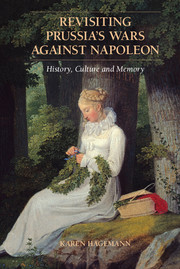Book contents
- Frontmatter
- Epigraph
- Contents
- List of Figures and Maps
- List of Abbreviations
- Acknowledgments
- Revisiting Prussia’s Wars against Napoleon
- Part One A History of Defeat, Crisis and Victory
- Part Two Discourses on the Nation, War and Gender
- Part Three Collective Practices of De/Mobilization and Commemoration
- Part Four Literary Market, History and War Memories
- 12 Politics, Market and Media
- 13 Inventing History
- 14 Remembering the Past
- Conclusion
- Part Five Novels, Memory and Politics
- Epilogue Historicizing War and Memory, 2013–1813–1913
- Bibliography
- Name Index
- Subject Index
- Plate section
- References
13 - Inventing History
Nostalgia, Historiography and Memory
Published online by Cambridge University Press: 05 March 2015
- Frontmatter
- Epigraph
- Contents
- List of Figures and Maps
- List of Abbreviations
- Acknowledgments
- Revisiting Prussia’s Wars against Napoleon
- Part One A History of Defeat, Crisis and Victory
- Part Two Discourses on the Nation, War and Gender
- Part Three Collective Practices of De/Mobilization and Commemoration
- Part Four Literary Market, History and War Memories
- 12 Politics, Market and Media
- 13 Inventing History
- 14 Remembering the Past
- Conclusion
- Part Five Novels, Memory and Politics
- Epilogue Historicizing War and Memory, 2013–1813–1913
- Bibliography
- Name Index
- Subject Index
- Plate section
- References
Summary
It is a dangerous time, this time of transition, which will probably not be over in half a century. Often, it appears to lift us, to shoot us to the stars and beyond with hopes, designs and prospects, and then dash us deep into the dust, and indeed sometimes into the mud, to remind us of all things human and mundane.
Ernst Moritz Arndt wrote these words in May 1817 to his friend Councilor of War Johann Georg Scheffner in Königsberg. Like many of his contemporaries, he sensed that he was living in a period of transition and rapid transformation. The experience of the French Revolution and the Napoleonic Wars had changed the perception of time in many ways, leading to a “memory crisis” that educated contemporaries responded to in large numbers by turning toward history. The intensity of the renewed “historical impulse” since the early nineteenth century expressed the powerful perception of a “deprivation of the past.” In the German-speaking region this development became evident not just in the political journalism and Romantic literature of the time, but also in the writings of early historicism, which turned with heightened interest to the German past, including the most recent events. The first accounts of the history of the wars of 1813–15 and the “time of the French” appeared soon after it was over. In subsequent decades, this historical impulse expressed itself in the development of history into a professional academic discipline and the accompanying triumph of historicism, the founding of a variety of archaeological and historical societies as well as local historical and museum associations, in the culture of monuments and not least in the first boom in autobiographies and war memoirs and the growing treatment of subjects from history in other literary texts such as biographies and novels. The development of this history boom suggests that – apart from a number of more general factors that led to a discovery of the past and a growing interest in historical topics among the broader public – the period of the Napoleonic Wars itself was such a formative experience for contemporaries and subsequent generations that it required intensive processing in individual and collective memory beyond the national politics of memory pursued by the state, the military and churches.
- Type
- Chapter
- Information
- Revisiting Prussia's Wars against NapoleonHistory, Culture, and Memory, pp. 273 - 300Publisher: Cambridge University PressPrint publication year: 2015
References
- 1
- Cited by

